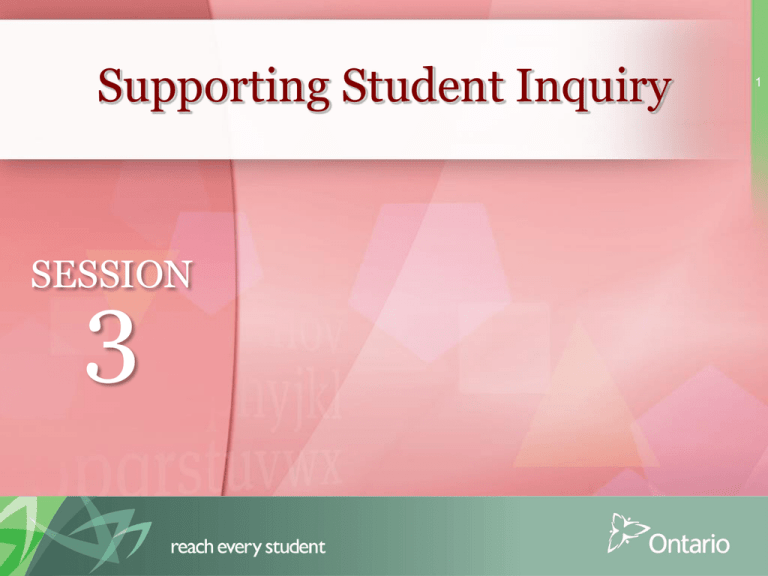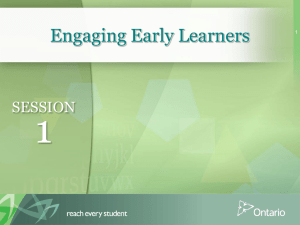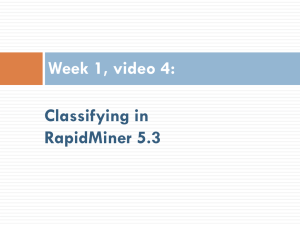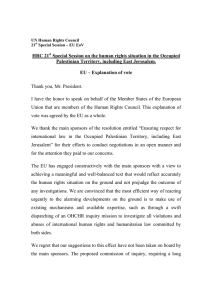Thinking about Thinking
advertisement

Supporting Student Inquiry SESSION 3 Thinking about Thinking: Becoming an Independent Reader 1 Overview Becoming an Independent Reader is a professional learning resource with four sessions: 1. 2. 3. 4. Engaging Early Learners Making Thinking Visible Supporting Student Inquiry Reflecting on Learning Thinking about Thinking: Becoming an Independent Reader 2 Key Messages • The purposeful integration of the four roles of the literate learner supports higher-order thinking and student independence in early primary classrooms. • An inquiry approach to teaching and learning leads to student and teacher efficacy and supports the development of independence in reading. • On-going reflection on research findings and classroom practices deepens the professional knowledge of educators and informs their teaching practices. • Ministry resources (e.g., monographs, webcasts and curriculum documents) support early primary teachers in planning effective literacy instruction. Thinking about Thinking: Becoming an Independent Reader 3 4 “In adopting an inquiry stance, we push our beliefs out of their resting positions and engage in a cycle where new knowledge provokes new questions and where new questions generate new knowledge.” – Mitzi Lewison, Christine Leland, Jerome Harste Creating critical classrooms: K –8 Reading and Writing with an Edge (2008, page 17) Thinking about Thinking: Becoming an Independent Reader Setting the Purpose This session probes the following questions: • How does student inquiry support the development of thinking, reading and writing skills? • How does the integration of the four roles of the literate learner support student inquiry? • What is the relationship between integrated learning and student inquiry? • Why do 21st century educators need a repertoire of teaching strategies? Thinking about Thinking: Becoming an Independent Reader 5 It’s About a Repertoire: Allan Luke View a video on the web: It’s About a Repertoire: Allan Luke Thinking about Thinking: Becoming an Independent Reader 6 An Integrated Approach to Student Learning Thinking about Thinking: Becoming an Independent Reader 7 An Inquiry Approach to Learning Grade 1/2 Teacher View a video on the web: An Inquiry Approach to Learning Grade 1/2 Teacher Thinking about Thinking: Becoming an Independent Reader 8 Getting Started with Student Inquiry Inquiry is about asking questions and expanding understanding… •Inquiry builds on children’s natural curiosity. •Inquiry allows students to make decisions about their learning – and to take responsibility for it! •Inquiry leads to the development of higher-order thinking skills. Getting Started with Student Inquiry Capacity Building Series, 2011 Thinking about Thinking: Becoming an Independent Reader 9 Inquiry in Kindergarten View a video on the web: Inquiry in Kindergarten Thinking about Thinking: Becoming an Independent Reader 10 Sharing Learning View a video on the web: Sharing Learning in Grade 1 Thinking about Thinking: Becoming an Independent Reader 11 Thinking about The Four Roles of the Literate Learner Click here to connect Click here to connect Click here to connect Click here to connect Adapted from Literacy for Learning: The Report of the Expert Panel on Literacy in Grades 4 to 6 in Ontario (2004). For discussion purposes only. Thinking about Thinking: Becoming an Independent Reader 12 Thinking about Inquiry What are the learning needs of our students? What do they already know? What do they need to learn and do? How do we build on what they know? What are our learning needs? What was the impact of: What do we already know that we can use to support student learning needs? • the learning tasks/experiences? • our teaching actions? What do we need to learn to do to support student learning needs? What sources of evidence/knowledge can we utilize to learn this? What teaching actions will support student learning within the tasks and experiences? Thinking about Thinking: Becoming an Independent Reader What learning tasks and experiences can we design to support student needs? 13 Collaborative Teacher Inquiry reciprocal relevant adaptive collaborative reasoned reflective iterative Thinking about Thinking: Becoming an Independent Reader 14 Moving Thinking Forward “Confirmation bias” is the tendency to seek confirmation of what we already think, believe, know and do. When we read professionally, our natural inclination is to focus on the things that confirm what we already think, believe, know and do. Katz and Dack suggest that in order to “intentionally interrupt” the confirmation bias, we should highlight the things we don’t agree with and create an opportunity to make our tacit knowledge explicit – to create the conditions for possible real, new learning.” – Adapted from Steven Katz and Lisa Dack Intentional Interruption (in press) Thinking about Thinking: Becoming an Independent Reader 15 Connecting Theory and Practice “With such wide and varied bodies of knowledge to explore, and limited time to act on the specific needs of students, it is important that the use of expert knowledge is strategic and purposeful.” – Collaborative Teacher Inquiry, Capacity Building Series, 2010, page 4 Research articles to support ongoing professional learning are available to all members of the Ontario College of Teachers in the Members Area/ Margaret Wilson Library. Click here to connect Thinking about Thinking: Becoming an Independent Reader 16 Research Reflections on Session Three It’s a Mystery: A Case of Implementing Forensic Science in a Preschool Science Inquiry (Howett, Lewis & Upson, 2011) Reading through a Disciplinary Lens (Juel, Hebard, Haubner, Moran, 2010) Inquiring Minds Learn to Read, Write and Think: Reaching all Learners Through Inquiry (Wilhelm & Wilhelm, 2010) Thinking about Thinking: Becoming an Independent Reader 17 An Early Start on Thinking New Horizons in Comprehension (Epstein, 2008) (Keene, 2010) Curriculum Documents Sessions 1 – 4 All resource and curriculum documents used in Thinking about Thinking sessions are available online in PDF – click to download file to desktop. The Ontario Curriculum, Grades 1–8: Language, 2006 (revised) The Ontario Curriculum, Grades 1–8: Science and Technology, 2007 (revised) The Ontario Curriculum, Grades 1–8: Mathematics, 2005 (revised) The Ontario Curriculum, Grades 1–8: The Arts, 2009 (revised) The Ontario Curriculum, Grades 1–8: Health and Physical Education, 2010 (revised/interim edition) Thinking about Thinking: Becoming an Independent Reader A Guide to Effective Literacy Instruction, Grades 4 to 6 – Volume One, Foundations of Literacy Instruction for the Junior Learner, 2006 Part 1 & Part 2 The Full-Day Early Learning – Kindergarten Program, 2010–2011 (draft version) 18 Monographs Sessions 1 – 4 All monographs used in Thinking about Thinking sessions are available online in PDF – click to download file to desktop. • Asking Effective Questions in Mathematics – Capacity Building Series, 2011 • Collaborative Teacher Inquiry – Capacity Building Series, 2010 • Critical Literacy – Capacity Building Series, 2009 • Getting Started with Student Inquiry – Capacity Building Series, 2011 • Grand Conversations in Primary Classrooms – Capacity Building Series, 2011 Thinking about Thinking: Becoming an Independent Reader • Integrated Curriculum – What Works? – Research into Practice, 2010 • Integrated Learning in the Classroom – Capacity Building Series, 2010 • Let’s Talk about Listening – Capacity Building Series, 2009 • Primary Assessment – Capacity Building Series, 2010 • Student Identity and Engagement in Elementary Schools – Capacity Building Series, 2011 19 Research Articles Sessions 1 – 4 All research articles are available online in PDF to members of the Ontario College of Teachers. Click here to proceed. Session 1 • The Ecology of Learning: Factors Contributing to Learner-centred Classroom Cultures (Crick, McCombs, Haddon, Broadfoot, & Tew, 2007) • The Classroom Environment First, Last and Always (Roskos & Neuman, 2011) • Philosophy in Primary Schools: Fostering Thinking Skills and Literacy (Fisher, 2001) • Organizing Literacy Classrooms for Effective Instruction (Reutzel & Clark, 2011) Session 2 • Making Thinking Visible – How to Promote Engagement, Understanding and Independence in All Learners (Ritchhart, Church & Morrison, Karin, 2011) • Critical Literacy in Australia: A Matter of Context and Standpoint (Luke, 2000) • Using the Everyday to Engage in Critical Literacy with Young Children (Vasquez, 2009) • Teachers Talking to Young Children: Invitations to Negotiate Meaning in Everyday Conversations (Gjems, 2010) Thinking about Thinking: Becoming an Independent Reader 20 Research Articles Sessions 1 – 4 Session 2 (continued) • The Nature of Student Teacher Discourse in an Elementary Classroom (Dickson, 2005) • Orchestrating Discussions (Smith, Hughes & Engle, 2009) • Teachers Talking to Young Children: Invitations to Negotiate Meaning in Everyday Conversations (Gjems, 2010) Session 3 • It’s a Mystery: A Case of Implementing Forensic Science in a Preschool Science Inquiry (Howett, Lewis & Upson, 2011) • Reading Through a Disciplinary Lens (Juel, Hebard, Haubner & Moran, 2010) • Inquiring Minds Learn to Read, Write and Think: Reaching all Learners Through Inquiry (Wilhelm & Wilhelm, 2010) • An Early Start on Thinking (Epstein, 2008) • New Horizons in Comprehension (Keene, 2010) Thinking about Thinking: Becoming an Independent Reader 21 Research Articles Sessions 1 – 4 Session 4 • Children’s Self-Assessment of Their Schoolwork in Elementary School (Elder, 2010) • Using Self-assessment in Elementary Classrooms (Bingham, Holbrook & Meyers, 2010) • Who’s Afraid of the Big Bad Answer (Aukerman, 2006) • Launching Self-Directed Learners (Costa & Kallick, 2004) • Talking in Class: Remembering What is Important about Classroom Talk (Johnston, Ivey & Faulkner, 2010) Thinking about Thinking: Becoming an Independent Reader 22 Handouts Sessions 1 – 4 • Checklist for an Inclusive Classroom Community • Learning Environment Document Statements • Four Roles of the Literate Learner • Thinking about Inquiry • Making Thinking Visible Document Statements Thinking about Thinking: Becoming an Independent Reader 23 Videos Sessions 1 – 4 SESSION 1 • A Child’s Perspective on Reading 1.02 • Teaching with an Inquiry Stance Grade 1 / 2 Teacher 3:11 • Authentic Real-life Inquiry Kindergarten 4:27 • The Gradual Release of Responsibility 7:19 • Peer Conferencing in Grade 2 2:43 SESSION 2 • Talking About Learning in Kindergarten 2:14 • Reading Different Texts Grade 2 4:03 • Play-Based Learning in Authentic, Real-Life Contexts Kindergarten 2:17 • Relevance and Authenticity: Articulating Values and Beliefs and Taking Action Grade 2 6:20 • Reading the World: Allan Luke 5:12 Thinking about Thinking: Becoming an Independent Reader SESSION 3 • It’s About a Repertoire: Allan Luke 0:44 • An Inquiry Approach to Learning Grade 1/2 Teacher 3:06 • Inquiry in Kindergarten 3:06 • Sharing Learning in Grade 1 2:11 SESSION 4 • Student Teacher Reading Conference Grade 1 4:26 • Questioning and Listening Grade 1 3:14 • Consolidating the Learning Grade 2 5:55 24





